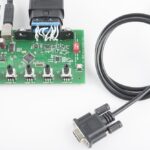Navigating the complexities of modern vehicle diagnostics often requires more than just a basic understanding of cars; it demands the right tools. For car enthusiasts and DIY mechanics, an OBD2 scanner is an indispensable piece of kit. While generic OBD2 scanners serve a purpose, they often fall short when it comes to in-depth diagnostics and accessing manufacturer-specific data. If you’re looking to step up your diagnostic game without breaking the bank, investing in a high-quality OBD2 scanner around the $500 mark can unlock a wealth of advanced features and capabilities. This guide will explore why spending a bit more can make a significant difference and what to look for in the best OBD2 scanner for $500.
Many vehicle owners start with inexpensive, generic OBD2 scanners, readily available online and in auto parts stores. These scanners are adequate for reading basic OBD2 codes, which are standardized across most vehicles. However, as your automotive DIY journey progresses, you’ll likely encounter situations where these generic tools simply don’t cut it. The limitations become apparent when dealing with more intricate issues or wanting to delve deeper into your vehicle’s systems.
One common frustration arises when encountering warning lights that a generic scanner dismisses with a “no problems here” message. This often occurs because many fault codes are manufacturer-specific, residing outside the scope of generic OBD2 protocols. For example, as experienced by one user attempting to diagnose a Honda, a standard OBD2 scanner failed to detect a Honda-specific fault. This highlights a critical point: manufacturer-specific codes are far more informative than generic OBD2 codes.
Stepping up to manufacturer-specific diagnostic tools, like the iCarSoft scanners mentioned by a user for Volvo and Mercedes, reveals a significant leap in diagnostic depth. These scanners not only cover generic OBD2 functions but also delve into proprietary manufacturer codes. For Volvo vehicles, an iCarSoft scanner can access and interpret Volvo-specific codes and display live data from numerous control units. This level of access is invaluable for comprehensive diagnostics and troubleshooting.
The market offers a range of options beyond manufacturer-specific scanners that bridge the gap between basic and professional-grade tools, often falling within the $500 price range. Brands like Autel are frequently considered for their broader vehicle coverage and advanced functionalities. When considering tools in this category, it’s essential to evaluate features such as:
- Vehicle Coverage: Does the scanner support a wide range of makes and models, including your specific vehicle(s)?
- Manufacturer-Specific Diagnostics: Does it go beyond generic OBD2 and access manufacturer-specific codes and data?
- Live Data Streaming: Can it display real-time data from various vehicle systems, aiding in pinpointing intermittent issues?
- Bidirectional Control: Does it allow you to send commands to vehicle systems to perform tests or activate components?
- Special Functions: Does it offer advanced features like service resets (oil reset, brake pad reset), component coding, or adaptation programming?
While user-friendly Bluetooth OBD2 adapters paired with smartphone apps like Carista and Carly are convenient for basic tasks and customization options accessible through car menus, their capabilities are limited compared to dedicated handheld scanners. These apps are excellent for changing settings and performing basic diagnostics, but they typically lack the in-depth diagnostic and bidirectional control features found in more professional tools. They may not allow for pairing new subsystems or performing complex coding procedures that experienced DIYers or professionals require.
It’s also crucial to exercise caution when considering “hooky” or pirated versions of OEM diagnostic software. As one cautionary tale illustrates, using unauthorized software can lead to serious issues, even “bricking” vehicle systems. The risk of software corruption or missing files in pirated versions can outweigh any perceived cost savings, potentially resulting in costly repairs and vehicle downtime. Opting for reputable tools from established brands ensures reliability, warranty support, and peace of mind.
Investing in a “best OBD2 scanner for $500” represents a sweet spot for many car enthusiasts and serious DIY mechanics. It provides access to advanced diagnostic capabilities beyond generic OBD2, often including manufacturer-specific coverage, live data, and bidirectional controls, without the significantly higher cost of top-tier professional scan tools. When choosing a scanner in this price range, prioritize vehicle coverage, manufacturer-specific functionality, and features that align with your diagnostic needs. This investment can empower you to tackle more complex automotive issues, understand your vehicle on a deeper level, and ultimately save money on dealership or mechanic diagnostic fees in the long run.
